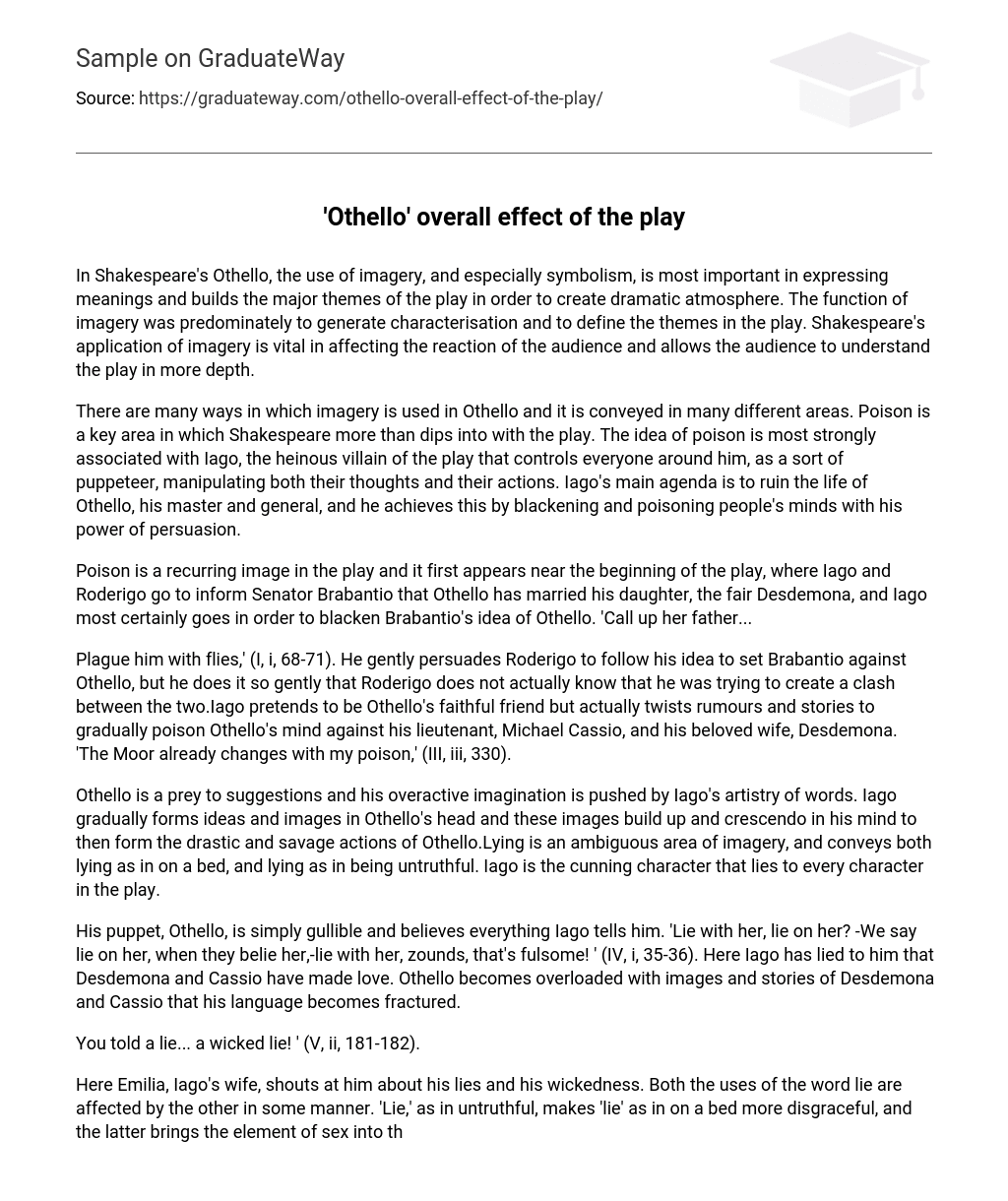The use of imagery, particularly symbolism, in Shakespeare’s Othello plays a crucial role in expressing meanings and constructing the major themes of the play, thus creating a dramatic atmosphere. Imagery primarily serves to develop the characters and establish the themes in the play. Shakespeare’s implementation of imagery is essential for influencing the audience’s reaction and enabling them to comprehend the play on a deeper level.
Shakespeare utilizes imagery in various aspects in Othello to depict the theme effectively. One prominent element where the use of imagery becomes evident is the portrayal of poison. This notion is primarily linked to Iago, the malicious antagonist who manipulates those around him like a puppeteer, exerting control over both their thoughts and actions. Iago’s primary objective is to destroy Othello, his commanding officer, by darkening and contaminating people’s thoughts through his persuasive abilities.
Poison is a motif that reappears multiple times in the play. The first instance occurs early on when Iago and Roderigo bring news to Senator Brabantio about Othello marrying his daughter, Desdemona. Iago’s intention is to tarnish Brabantio’s perception of Othello. He says, ‘Call up her father…’
Iago persuades Roderigo to provoke Brabantio against Othello by saying, “Plague him with flies” (I, i, 68-71). However, he does this subtly enough that Roderigo is unaware of his true intentions. While pretending to be Othello’s loyal friend, Iago manipulates rumors and tales to gradually poison Othello’s thoughts against his lieutenant, Michael Cassio, and his wife, Desdemona. Iago notes, “The Moor already changes with my poison” (III, iii, 330).
Othello falls victim to suggestions and Iago’s skillful manipulation of words sparks his overactive imagination. Gradually, Iago plants ideas and imagery within Othello’s mind, which gradually escalate and culminate in Othello’s extreme and brutal actions. Deception is portrayed through ambiguous imagery, encompassing both the act of lying down on a bed and being untruthful. Iago deceitfully lies to every character in the play, displaying his cunning nature.
The object of Iago’s deception, Othello, is easily fooled and trusts everything that Iago says. “Lie with her, lie on her? -We say lie on her, when they belie her,-lie with her, zounds, that’s fulsome! ” (IV, i, 35-36). In this quote, Iago has misled Othello by claiming that Desdemona and Cassio have slept together. Othello hears so many accounts and imagines so many scenarios involving Desdemona and Cassio that his speech becomes fragmented.
You deceitfully told a malicious lie! ‘ (V, ii, 181-182).
In this passage, Emilia, who is Iago’s wife, confronts him regarding his deceitful behavior and malicious actions. The significance of the word “lie” changes depending on its context. The word alludes to dishonesty, which in turn makes the meaning of “lie” as in reclining on a bed more shameful. Additionally, the presence of sexual undertones influences the concept of deception. Iago’s fabrications ensnare Othello and push him to behave irrationally and erratically.
Plants are significant symbols in the play and are closely associated with the character of Iago. He frequently refers to plants to represent his wicked plans taking shape within the characters’ minds. He says, “Our bodies are gardens, to which our wills are gardeners.”
According to Shakespeare (I, iii, 320-326), the power and control of this authority lies within our own wills. The play effectively uses vegetable metaphors and botanical references to symbolize these concepts.
Within the play, the characters’ personalities incorporate natural forces that can run rampant. Iago, specifically, understands these forces and acts as a literal gardener who wields the power to manipulate the characters as he desires. Iago views the minds of others as fertile ground, where he can plant his seeds of malevolence and cultivate them through lies and rumors into uncontrollable and wild entities. Othello appears to be particularly susceptible to Iago’s gardening skills. The manner in which Iago’s schemes consume and manipulate the other characters resembles the way natural forces overpower, rendering his wickedness seemingly unstoppable to anyone or anything.
Animals are a powerful motif in the play and serve to reveal the personalities of different characters. The libertine, Iago, especially utilizes animal imagery throughout the play. He employs animal comparisons to depict and exemplify the other characters. Examples include references to a ‘Barbary horse’ (I, i, 111) and an ‘old black ram’ (I, i, 88).
Iago uses racist remarks to portray Othello as the culprit who has taken Brabantio’s daughter. The comparison of Othello to a ram or horse implies that he is untamed and uncivilized, traits which become increasingly prominent in later scenes. In calling Desdemona a “white ewe,” Iago suggests her innocence and purity, suggesting that she can do no wrong.
The repetition of animal imagery implies a sense of inherent power within the characters. The diverse array of images in the play reveals its true themes and motifs, as well as the authentic personalities of the characters. Iago’s ability to deceive and manipulate through language is a testament to his persuasive prowess. Through his employment of natural imagery to illustrate plans and individuals, he passionately exhibits a desire for destruction while harboring intense hatred and jealousy towards Cassio and Othello.
Overall, Shakespeare employs images as a potent tool in conveying the play’s message to the audience.





